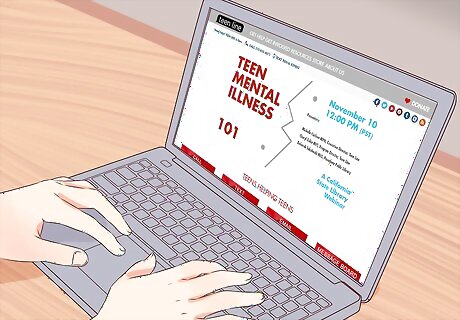
views
Weighing the Pros and Cons

Assess your reasons for running away. You may feel like the way out of a bad situation like peer pressure, family conflict, abuse, or drugs and alcohol is to run away. Yet before you make a quick decision about running away, it is important to reflect on why you are running away, and if there are less drastic ways to address your situation. Identify if there are ways to talk with your relatives, friends, or mentors at school before making a big decision to run away. Understand that running away will not likely fix the problem you’re facing. Think about running away as a worst case scenario, not the first way to handle your problem. Utilize any supports you have in your community first, including your school, places of worship, community centers, and friends. Understand that running away may feel like the only option in the heat of a moment, but in reality you may face the same or worse challenges after the fact.

Determine whether or not you are being abused. Physical or sexual abuse are particularly harmful, even if it happens once. Emotional abuse may more difficult to pinpoint if it happens once, but if it happens on a regular basis it can be just as traumatic. Types of physical abuse include punching, biting, scratching, strangling, pushing, or kicking. It could involve objects being thrown at you. It involves an intentional and unwanted contact with you or something close to your body. Types of sexual abuse include unwanted kissing or touching, pressuring or threatening someone into unwanted sexual activity, attempted rape, rape, or non-consensual sex. Types of emotional abuse include repeatedly humiliating you, threatening to harm you or others in your family, putting you down with derogatory names, yelling or screaming at you on a repeated basis, or repeatedly blaming you for their own actions.

Evaluate the pros. If you are currently in danger of ongoing physical, sexual, or emotional abuse, running away could take you out of immediate danger. Don't allow yourself to be put at risk of physical or sexual harm. If you are running away to escape physical or sexual abuse, call the National Runaway Safeline which is open 24/7: 1-800-RUNAWAY (1-800-786-2929) or http://www.1800runaway.org/ If you or your family are in imminent danger, in which you or another person's life is physically threatened, call 9-1-1 for immediate assistance.

Evaluate the cons. Being a runaway will likely involve having a lack of shelter, food, or physical safety. Avoid running away without a plan in place for your safety. If you are running away from a difficult family life, you will likely find that it could be even harder on the streets. There are many cons to running away. Understand that homeless runaways are at high risk of being sexually exploited, becoming dependent on drugs or alcohol as a means to cope, and being victimized or placed in dangerous situations. You could also end up in trouble with your local law enforcement. Think about these questions: How will you pay for food? Where will you sleep? How will you get in touch with people in case of an emergency? What happens if you’re feeling more afraid or scared after leaving home? Without a good answer to these questions, running away will often make matters worse for yourself and your loved ones. They will be worried about your safety, which is a real concern.

Seek crisis support through the National Runaway Safeline. If you’re feeling like running away, and you need to talk with someone immediately about what you’re going through, then call, text, chat or email the National Runaway Safeline which is open 24/7: 1-800-RUNAWAY (1-800-786-2929) or http://www.1800runaway.org/ Talk with a trained social service professional about the pros and cons of running away. If you are currently being physically, sexually, or emotionally abused, call them for support immediately. Use their advice as a guide about the options available to you in your community. They can create a safety plan with you. Listen to them about resources such as local runaway shelters, and possibly free counseling services for at-risk youth.
Evaluating Your Safety

Ask yourself what you need to be safe. What would make it okay for you to stay at home? Turn to people you trust in this difficult time, and express to them what you think you would need to be safe at home. Explain about your thoughts about running away. Be honest with them about your feelings. See if they would be willing to listen to you if you needed to call them in times of struggle or fear. Ask the people you trust if you can depend on them for support if you ended up in trouble.

Identify places that make you feel safe. Always have a plan in place of where to go when you’re feeling overwhelmed, scared, or hurt. Think about the places that make you feel loved and safe. Identify spaces or rooms in your home where you feel safest. Is it your bedroom? A living room? A kitchen? Use those spaces when you’re feeling anxious and need time away from your family. Find ways to take a deep breath, and calm your mind in that moment. Identify other places in your community where you feel safe, such as your school, community centers, or places of worship. Seek out professionals and mentors that work or volunteer there to express your need for guidance. They can help you better assess the pros and cons. Identify your friends’ or family members’ homes where you can go if you need some time away from your family to feel safe. Understand what runaway and homeless shelters offer (and don’t offer) in terms of support.

Recognize that incidents of abuse or neglect may be reported for your safety. If there are possibly incidents of abuse or neglect by a parent or guardian when you are under 18, some school or healthcare professionals may be required by law to report those incidents. In such cases, a report may be made to Child Protective Services agency for evaluation. This does not automatically mean that you will be removed from your home or that your guardian will be disciplined. Each evaluation is case-by-case. Talk with a school administrator or counselor that you trust about what may or may not happen when abuse is reported. If you are fearful of retaliation, talk with a school counselor or other adults who you trust about your need for safety.
Seeking Support

Have someone to call if you’re in trouble. Make sure to keep a phone or phone numbers of one or two reliable friends, family, or community members. They should be the people you call when you’re feeling scared, depressed, upset, or anxious. Call your friends when you need help to calm down about what you’re feeling. It will be best to have at least one contact that is an adult, not just other friends. Think about if there is an aunt, cousin, or grandparent that you can call when you’re feeling upset. If you’re feeling like running away, talk with a mentor at the community center or a religious leader in private about your feelings. They may have advice on youth activities that can help cope in healthy ways.

Seek advice from your school or a counselor. Find a supportive teacher or school counselor that you talk with about your home life and thoughts about running away. Discuss with them in private your concerns. Avoid utilizing only your friends for guidance on how to handle family conflict or issues of abuse. If you feel unable to talk with staff at your school about your problems, find local community centers or a counseling center that may be able to assist. See if your school, friends, or relatives can recommend any professional counseling services in your area. Professional counselors and social workers are trained to address family conflict and other difficult issues. If you are having difficulty with talking to your parents or relatives, family therapy may help you learn to cope with your family.

Reach out to your trusted relatives and mentors. Don’t feel alone in this situation. While it may seem like there is no way out, or that life is too overwhelming, there are others who have faced similar challenges. Seek out support from adults who you trust with personal information. Find others in your community who are facing difficult family situations. Within your family, think about adults such as cousins, aunts, uncles, grandparents, or other relatives that have overcome difficult family challenges such as domestic violence, abuse, substance abuse, divorce, or financial stressors. Ask community leaders or mentors for support and advice about how they overcame their stressors and what they may recommend.

Connect with peer support specialists online or by phone. There are other teens that can provide emotional support or just a listening ear by phone or via text, chat, or email. They are trained volunteers the same age as you. They can help you to manage stress and learning healthy coping skills. Contact the Teen Line by phone or reach out to them online: 310-855-4673 or https://teenlineonline.org/ Look for other peer support groups that may be offered through your school or in your community. Consider engaging with other teens who can provide an objective perspective on your situation. There may be other online peer support group sites available if you’re thinking about running away or can’t cope with your difficult family.

Avoid relying on your partner to determine if you will runaway. They may lack knowledge about what obstacles you may face. While they may be easier to talk with than your family or some adults, thoughts of running away should involve talking with people who can provide possibly concrete options about how to cope. It’s important to have someone on your side who isn’t trying to force you one way or the other.
Considering Alternatives

Learn to ask for help rather than running away. While asking for help may seem embarrassing, scary, or anxiety-provoking, running away may be worse. Running away is only a temporary (and possibly more dangerous) solution to your problem. While it may seem like a bigger risk to speak up, this is a much healthier way to confront your problem than to run away from it. Make sure to find a supportive person who can help you step by step through this act of speaking out. Talk with a counselor, teacher, mentor, or caring relative. You’re not alone. Prioritize your safety over your guilt, shame, or hurt. Remember that things can get better. Accept that while you can not control other people’s actions. You make the best effort to handle your own in a responsible and mature way.

Find out if can stay with a friend or relative when you’re stressed. Sometimes we need a little distance from family or friends who are making us stressed or anxious. Instead of making plans to run away, consider having a sleep-over at a friend or family member’s home where you feel safe and supported. Avoid sneaking around or avoiding your family when you’re trying to find a place to stay with friends or relatives. Tell your family that you’re trying to be honest with them rather than sneaking out and that you hope they can respect what you’re feeling. Avoid asking your parents or guardians to “leave” and instead ask in a calm manner, “Can I spend some time with [friend or family]? I’m feeling overwhelmed right now, and I just need a little space. I will make sure to be back by [time/date].” Coordinate this plan and transportation arrangements before you ask your parents or guardian.

Cope with your home life in healthy ways. Identify the strengths in yourself, in others, and in your surroundings to help with stress, anxiety, and depression. Focus your time and energy on being with people who make you feel safe and happy. Find activities that make you feel more confident that you can overcome challenges. Hang out with or find friends that may you feel included, supported, and reassured. Avoid the negative people who bully, reject, or hurt you. Take time for yourself. Take a hot shower to feel better. Engage in daily breathing exercises to help you calm down. Make sure to get enough rest. Consider praying or meditation. Do activities that make you happy and relieve stress. Listen to your favorite music with headphones. Draw in an art book. Write in a journal about what you’re feeling. Play music or sing. Get active. Get out for a walk or run. Ride your bike. Do stretches at home or outside. Consider taking an after-school fitness or martial arts class. Join a sports team at your school. Go to a local gym or activity center.













Comments
0 comment